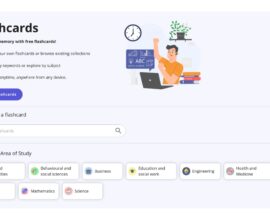How To Create a Study Timetable in 7 Easy Steps
Do you always have something you’d rather do than sit down and study? If you frequently start your study time based on how you feel (and end up playing your favourite video game or catching a show on Netflix), you’ll be forced to put your social life on hold completely during busy times—like when you’re completing assignments at the last minute or cramming to prepare for exams.
Unfortunately, motivation is fleeting and often short-lasting. Building a more disciplined routine with designated periods of study time has consistently proven far more effective in the long run – and helps you build habits as you go.
That is why following a carefully crafted study timetable is important. It allows you to prioritise the activities you love while leaving enough time for studying!
If the idea of making a personalised study plan makes you cringe, we’ve got you covered! Here’s a quick and helpful step-by-step guide to creating a study timetable that you will actually stick to and help you achieve more balance in your daily routine.
What Are the Benefits of Creating a Study Timetable for University Students?
Creating a practical study timetable and sticking to it all year will help you:
- Master effective time management strategies
- Get extra downtime in your week to relax
- Develop a consistent study routine and avoid the guilt of not having time for studying
- Accomplish your daily tasks on time throughout the semester
- Prepare for exams/tests early on and avoid last-minute stress
- Spend quality time with friends and family
- Review Your Current Schedule
Uni students lead busy lives, balancing attending lectures and classes, homework or assignment work time, and often working around evening or shift-based part-time jobs. To create a practical study timetable, you should analyse your current class schedule and understand how you spend the rest of your day.
Assess how many hours you spend every week on different activities, for example:
- Attending classes
- Engaging in after-school commitments
- Resting, exercising or having planned downtime
- Travelling to university and back
- Doing homework, school projects, and assignments
- Attending social events
The goal is to figure out what your average weekly schedule looks like and know how much free time you’re working with.
- Make a List of Your Non-Negotiables
The secret to building a study timetable that you’ll happily follow is deliberately planning for leisure and extracurricular activities. Balance is key to avoiding burnout! Think about the fun stuff you love to do and write them down. It could be a hobby or anything else, for example:
- Going for sports practice
- Playing video games
- Exercising or going for evening walks
- Having some downtime to relax
- Meditating or journalling
Include the essential daily chores, such as cooking, and important dates like your best friend’s birthday or family get-togethers on the list.
It’s possible to get carried away, so make sure you evaluate the list thoroughly and cross off any unnecessary tasks.
After evaluating your list, you can work out the amount of time or days you would allocate to each activity every week. For instance, if you go for soccer every Tuesday and Thursday from 4–6 pm.
- List Your Study Activities
It’s time to check your university timetable and identify the schoolwork you need to create time for. Write down all the essential tasks and projects that impact your academic success, such as:
- Regular assignments/essays
- Course projects
- Daily uni class schedule
- Homework
- Preparation for continuous assessments and exams
- Revision for course material
Remember to list deadlines for each task. Attaching deadlines will help you prioritise important tasks and challenging assignments that demand more time to complete.
- Identify Your Optimal Times of the Day
What are your most productive hours of the day? Are you a night or morning person? Knowing how your concentration levels vary throughout the day will help you plan activities at the most appropriate time.
You should put your study sessions during your peak hours and use the time when your concentration levels are low for leisure, social, and extracurricular activities. Learning about your prime time and scheduling your study sessions appropriately will help you get the most out of your study time—without feeling as though you’re starting to burn out.
It’s okay if you don’t know your peak hours just yet. You can establish your prime time by observing and documenting how your concentration, energy, and motivation levels change throughout the day.
- Decide on the Right Timetable Format
You can create your timetable on a piece of paper or opt for digital formats. Both options are great so go with the best approach for you.
For the digital study timetable, you can use:
- Spreadsheet programs, like Microsoft Excel or Apple Numbers
- Apps like MyStudyLife or Timetable
Depending on how detailed you want to be, you can make a monthly or weekly study timetable. Make a grid by dividing it into hours, days, weeks, and months up to where your semester ends.
- Fill Out Your Timetable
With your lists of academic and extracurricular activities in place, you are ready to fill your timetable.
Start by blocking out the time or days you won’t be able to study because of different activities such as:
- Fixed commitments like uni classes, evening jobs, and important meetings
- Items on your non-negotiable list
- Downtime and travel time
- Important dates like exam dates
- Important occasions, such as anniversaries and national holidays
Your timetable should have gaps, and now you can see where to schedule your study time.
Here are a few top tips to keep in mind when adding your academic projects to your timetable:
- Prioritise the tasks by the due dates and amount of time required to complete them
- Ensure there are enough gaps in your schedule—If there are no gaps, any new homework, backlog, or unforeseen situations will get in the way of following your study plan
- Schedule the tough projects and subjects during your optimal times
- Allot sufficient time, especially for more demanding tasks
- Choose the length of your study periods carefully—If you start to lose concentration, you will become ineffective and waste time. The most common study sessions are divided into:
- 25 minutes study session followed by a five minutes break
- 45-50 minutes block and a 10 minutes break
When it comes to the length of your study session, experiment with different study times and go with what works best for you since every student is different.
- Revise Your Study Timetable
After a few weeks, it’s a good idea to fix what doesn’t work for you. Did you find it hard to concentrate for 45 minutes? Cut the study periods to 25 minutes.
The best way to know what works for you is to document your progress as you follow the timetable. This will give you valuable information for adjusting your study timetable with realistic sessions. Some of the things you can keep note of include:
- The amount of time it took to complete scheduled tasks
- Your most productive and least productive times of the day
- Activities that made you procrastinate
- The sessions when you achieved your learning goals
You should use such information to update your study plan. The more you can adapt your timetable to suit your daily activities, the more efficient and helpful it will be.
Sometimes you have to revise your timetable completely to accommodate any new adjustments like uni class schedule changes.
Conclusion
The first days of following a structured schedule won’t be easy, but you’ll start to enjoy the study-life balance once it becomes part of your routine.
Try to stick to the schedule as much as possible but remember that it’s okay if some days don’t go according to plan. Instead of using the study plan as written law, use it as a guideline. The most critical thing is that you are building solid study habits and slowly gaining control of your time.
If you want to take your study sessions to the next level, add Zookal Study, an online study app, as your study partner. When you get stuck on a question, our expert tutors are always available to provide the assignment help you need. You’ll also access our range of smart study tools like flashcards to help you boost your memory and ace your exams!






